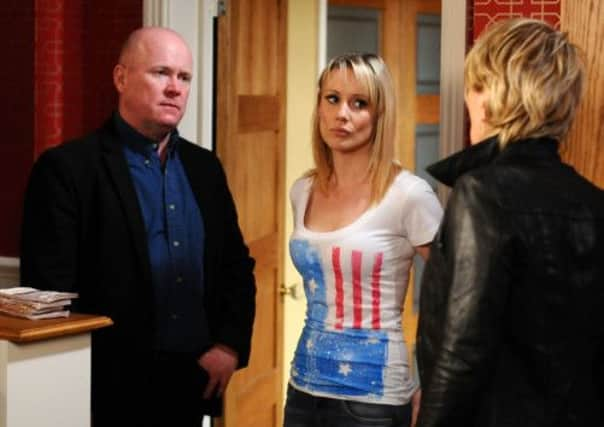Fiona McCade: I can’t ‘Adam and Eve’ accent study


He asked her to please repeat whatever it was she had said. “Alavv,” she tutted, irritated at his slowness, “A PAYUW AYUW.”
The dialogue soon drew a crowd, with everyone desperately trying to translate what it might possibly be that the Southern lady wanted. Until a victorious shout went up: “She wants a PALE ALE!”
Advertisement
Hide AdAdvertisement
Hide AdThe bad news is that the marriage did not survive. The good news is that if a Glaswegian had been in the pub that night, they would probably have understood everything the lass was saying.
A study by the phonetics department of the University of Glasgow has found that the way people talk in the Dear Green Place is starting to change, with traces of various London accents starting to appear within the local dialect. And the reason is EastEnders.
Apparently, Glaswegians who watch EastEnders “actively” and are “engaged” with the programme have begun to speak more like the characters on screen. So, for example, a true Scot who may once have said “nothin’” is now, thanks to over-exposure to the delights of Albert Square, quite likely to say “nuffink”.
This thought makes my toes curl, because the accents of the London conurbation are among the most unattractive in the British Isles. Only Birmingham sounds worse. If we’re going to allow television to influence us into losing our spoken heritage, can’t we all start watching something like Father Ted, so at least we sound slightly charming? Frankly, if home-grown Scots gentlewomen are going to start screaming: “Watcha fink you’re lookin’ at choo shtewpid cahh?” at each other, as happens four times a week in Albert Square, I may have to emigrate.
But maybe that’s too hasty. Just because a few weak-willed Weegies are allowing themselves to be influenced by Phil Mitchell and company doesn’t mean that all is lost.
I’ve watched so many American TV series, I really should be speaking with a mid-Atlantic twang by now, but I don’t seem to be metamorphosing into Loyd Grossman. Likewise, I remember back in the 80s how the whole of Britain appeared to be obsessed with who had shot JR in Dallas, but I can’t recall anybody actually becoming Texan.
Come on Glasgow, what’s the matter with you? People have been watching Coronation Street for 50 years, but I haven’t noticed large chunks of the UK population unintentionally drifting into Mancunian whenever they speak. Nor have many people taken to saying “G’day!” instead of “Hello” over the past 30 years, thanks to a daily diet of Neighbours.
Let’s hope that the University of Glasgow team will also discover that millions of us are suddenly speaking beautiful, cut-glass Queen’s English, because we have actively engaged with our boxed sets of Downton Abbey. That would certainly be easier on the ear than Londoners squawking.
Advertisement
Hide AdAdvertisement
Hide AdI say “Londoners”, because very few of the EastEnders cast are genuinely Cockney. Most of them are Mockney. The only authentic, old-style Cockney on the show is Barbara Windsor. These days, most East Londoners speak what one 2010 socio-linguistics survey dubbed “multicultural London English” – which might explain why so many modern Cockneys sound like they’re just back from Jamaica.
Regional accents are one of the joys of Britain and if some Glaswegians are letting the side down by turning into a cross between Ali G and Alan Sugar, I hope we can coax these wannabe Pearly kings and queens back to their roots.
Perhaps if Scotland says Yes to independence, we can start by flooding the TV schedules with Scottish shows, to remind the good people of Glasgow how to talk. A dose of Rab C Nesbitt – without subtitles – followed by wall-to-wall Taggart should draw the stragglers back into the fold. If that doesn’t work, Stanley Baxter’s parliamo Glasgow can become the basis for a new language curriculum in schools.
In the meantime, to redress the balance, River City must go to five episodes a week. And as far as EastEnders is concerned, every time there’s a scene inside the Queen Vic, the juke box should be playing the Proclaimers.